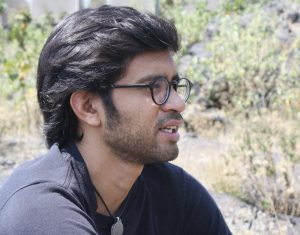Translated by students of Spanish 319: On Translating Cultures and Disciplines. Fall 2018.
Read by Hayley M. Griffiths
City Without Trees
You will not know the trees.
You will never hear their green secrets
that today whisper into the ears
of the winds nor will your hands know
the rugged caress of trunks
that safeguard the edges of the road.
There won’t be a perch in your patio
for the red song of the cardinals,
for the sweet apple flame of august,
nor any shade that silences the barking of the dog days,
nor heights where the serpent’s
legless venom cannot crawl.
It will be hard for you to imagine that below the asphalt
are the roots of an ancient city
of rugged columns,
sonorous domes of birds and suns.
Through the crystals of a diorama
you will see mute creatures,
contraptions made of plastic, wood and nostalgia,
just as we now see the captive
buffalo yearning for the vastness of the prairie.
You will hear amazing stories from another time
when packs of walnut trees exhaust
the forest in search of the gift of currents.
The tree for you will be planted
in the remote dust of the library,
it will flourish in the strange paragraphs
of a curious treatise on mythology.
Perhaps when leafing through an old book
you will envy the one who on an afternoon
heard the wind fly between leaves
and tried to sow in their words the whispers,
the secrets that you’ll never again listen to,
of the last tree that lived on Earth.
Leído por el autor
ciudad desarbolada
No conocerás el árbol.
No escucharás jamás estos secretos
verdes que hoy susurra en el oído
de los vientos ni sabrán tus manos
de la áspera caricia de los troncos
que custodian las orillas del camino.
No habrá en tu patio rama en que se posen
el canto colorado de los cardenales,
el dulce fuego de manzanas en agosto,
una sombra que acalle el ladrar de la canícula,
ni alturas donde no pueda trepar
el veneno sin pies de la serpiente.
Te costará imaginar debajo del asfalto
las raíces de una antigua ciudad
de rugosas columnas,
bóvedas sonoras de pájaros y soles.
Verás a través de los cristales
de un diorama unas criaturas mudas,
armatostes de plástico, madera y de nostalgia,
tal como vemos ahora a los cautivos
bisontes que añoran la amplitud de las praderas.
Escucharás historias increíbles de otro tiempo
en que manadas de nogales fatigaban
el bosque en busca del don de las corrientes.
El árbol para ti estará plantado
en el polvo remoto de la biblioteca,
florecerá en los párrafos extraños
de un curioso tratado de mitología.
Tal vez al hojear un libro viejo
envidies a ese que una tarde
escuchó el viento volar entre las hojas e intentó
sembrar en sus palabras los susurros,
secretos que jamás escucharás,
del último árbol que habitó sobre la Tierra.




